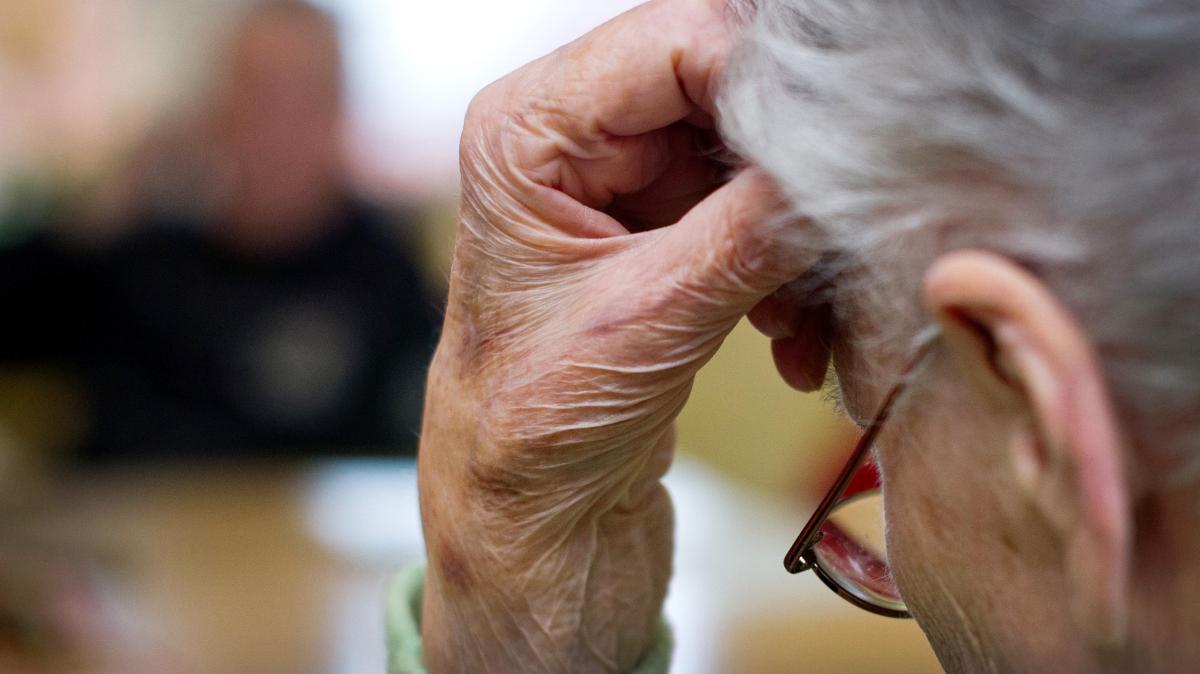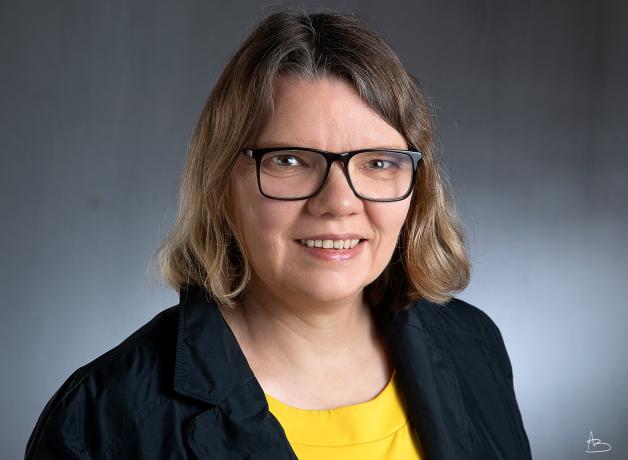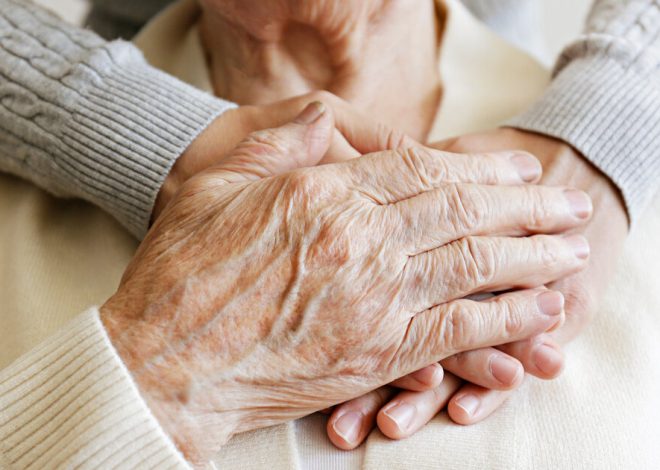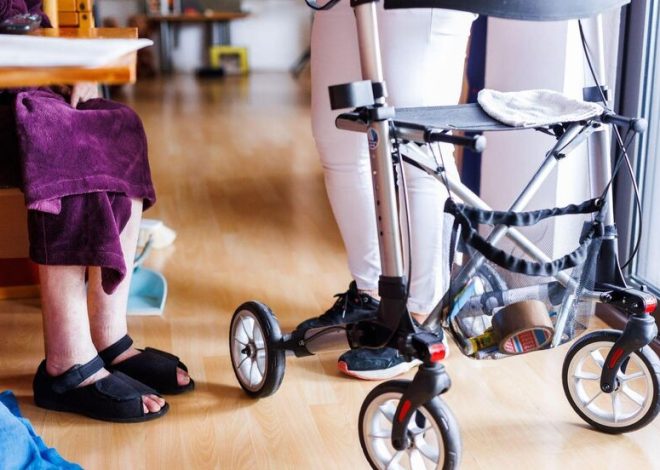
Pension from nursing care insurance: Why it hardly works.
Edeltraut Hütte-Schmitz still remembers how her own everyday life was completely turned upside down when her husband was diagnosed with amyotrophic lateral sclerosis (ALS). A disease that gradually paralyzes the muscles, making it difficult for patients to move and later also to speak and swallow. The best-known person affected is probably the physicist Stephen Hawking, who died in 2018.
How life changed after being diagnosed with ALS
Her husband Karl-Heinz was 56 years old at the time and was in need of help after just a short time. For Edeltraut Hütte-Schmitz it initially just meant “driving him to work and picking him up again”. They couldn’t find a barrier-free apartment in Arnsberg in the Sauerland region, so they converted their own home.
The amount of care required steadily increased. Washing and dressing were necessary until a nursing service provided some relief for at least half an hour a day. Also a housekeeping help with the 125 euro relief amount and later even a care service for the office day, which the couple partly had to pay for themselves.
“I couldn’t leave my husband alone anymore.” It’s a simple calculation: the nursing service, support service and housekeeping help took around eleven hours of care a week for Hütte-Schmitz. The rest stuck to her.
Pension: Nursing care insurance covers contributions
More than four million people in need of care in Germany are cared for at home, mostly by relatives alone. This is not a trend that is likely to change much; surveys and surveys regularly show that most people would prefer to stay at home when they need care and that care services have become rare.
Edeltraut-Hütte-Schmitz cared for her husband Karl-Heinz, who was seriously ill, for four years.
Photo: Photography Anneser, Arnsberg

This not only involves a lot of effort for the relatives, but in some cases they also have to reduce their working hours and then suffer losses in their pension. Anyone who talks about poverty in old age can rarely avoid the fact that those who take care of relatives are usually affected. Also because offers such as day care are few and far between.
At a glance: What a year of care can do for your pension
There is an instrument in Germany’s nursing policy that is intended to prevent exactly that. For those who care for relatives, the nursing care insurance pays contributions to the pension insurance. Depending on whether a nursing service comes and how high the level of care is, relatives can collect pension points. Almost a full pension point can be credited for one year of care. Anyone who cares for a relative with the most severe impairments for around 23.5 hours but has the nursing service come for half an hour must accept a 15 percent loss in their pension entitlement.
They don’t like the fact that nursing care insurers have to pay pension contributions. The umbrella association sees this as a non-insurance service and demands that the federal government take on this task. Because the pension contributions cost billions. In 2022 alone, the German Pension Insurance (DRV) said it collected 3.4 billion euros from long-term care insurers. And the costs have been rising for years as there are more and more people in need of care and therefore more and more relatives who need care.
The point at which one is considered an authorized caring relative is precisely defined:
- The care must not be carried out on a gainful basis
- care must be provided for more than 60 days or two months
- The person in need of care must probably need care for at least six months
- The person in need of care must have at least care level 2
- Care must be provided on at least two days and at least ten hours per week. With two people caring for a person in need of care, it is already 20 hours, with three people 30, etc.
- The caring relative may not work for more than 30 hours per week.
This last point in particular is often met with incomprehension by caring relatives. Because even if some relatives have to reduce their working hours, not everyone can. A study by the German Social Association came to the conclusion that 28 percent of family caregivers work full-time.
“Many nursing relatives rely on full-time jobs”
The independent advisory board for the compatibility of care and work also came to the conclusion in 2023: “There is a large discrepancy in numbers between those in need of care who are cared for by relatives and caring relatives who are insured as carers in the pension insurance.”
Edeltraut Hütte-Schmitz is now managing director of the advocacy group for caring relatives “we care”.
Photo: Photography Anneser

This means: Apparently the assumption of pension contributions by nursing care insurance for caring relatives is more theory than practice. For the more than four million people in need of care at home, there are now only a little more than one million carers for whom pension contributions are paid by the care funds, as the German Pension Insurance announced in response to a request from our editorial team.
How caring relatives want to achieve more recognition under pension law
For Edeltraut Hütte-Schütz, who is now the executive director of the association “wir nursing” – an advocacy group for caring relatives – this 30-hour limit is an “outrageous thing”. “Caring relatives who rely on a full-time job to secure their livelihood are left empty-handed,” she summarizes.
Especially when one’s partner becomes in need of care and thus loses income, it is hardly possible for households with low incomes to reduce working hours. “Something like this can usually be afforded by those who have capital and are not dependent on work for their livelihood. And then they also get the pension points. The fact that things can be done differently is shown, for example, by the way parenting times are handled, for which parents receive pension points. There is one full pension point for one year of education. Without cuts. And no matter how much you work on the side.
She continued to work full-time while caring for her husband. “In addition, there were 30 hours of basic care and another 15 hours of combat duty, mostly at night,” she says. For caring relatives like her, combat missions are primarily the work of getting help at all: applications, objections, paperwork. Since Karl-Heinz Schmitz, as a state civil servant, is dependent on the benefit agency in addition to nursing care insurance, she had to apply for help from several agencies. “Almost no application goes through on the first try. You always have to file an objection or submit documents,” she says.
With luck she was in bed before midnight. In addition to a 40 hour full time job. She received “zero point nothing” for her pension through care.
Despite the stress of care: “It was an intense, fulfilling time”
Despite all the burden of care and all the struggles with bureaucracy and insurance, one thing is particularly important to her: “It was a very intensive time for both of us and also very fulfilling. As a married couple, you are never as close to yourself as you are in these years.”
Edeltraut Hütte-Schmitz can now tell everything objectively and tidily, even though every syllable shows how much she misses her Karl-Heinz. In 2017, four years after being diagnosed with the incurable ALS disease, Karl-Heinz Schmitz died.

Ethel Purdy – Medical Blogger & Pharmacist
Bridging the world of wellness and science, Ethel Purdy is a professional voice in healthcare with a passion for sharing knowledge. At 36, she stands at the confluence of medical expertise and the written word, holding a pharmacy degree acquired under the rigorous education systems of Germany and Estonia.
Her pursuit of medicine was fueled by a desire to understand the intricacies of human health and to contribute to the community’s understanding of it. Transitioning seamlessly into the realm of blogging, Ethel has found a platform to demystify complex medical concepts for the everyday reader.
Ethel’s commitment to the world of medicine extends beyond her professional life into a personal commitment to health and wellness. Her hobbies reflect this dedication, often involving research on the latest medical advances, participating in wellness communities, and exploring the vast and varied dimensions of health.
Join Ethel as she distills her pharmaceutical knowledge into accessible wisdom, fostering an environment where science meets lifestyle and everyone is invited to learn. Whether you’re looking for insights into the latest health trends or trustworthy medical advice, Ethel’s blog is your gateway to the nexus of healthcare and daily living.



